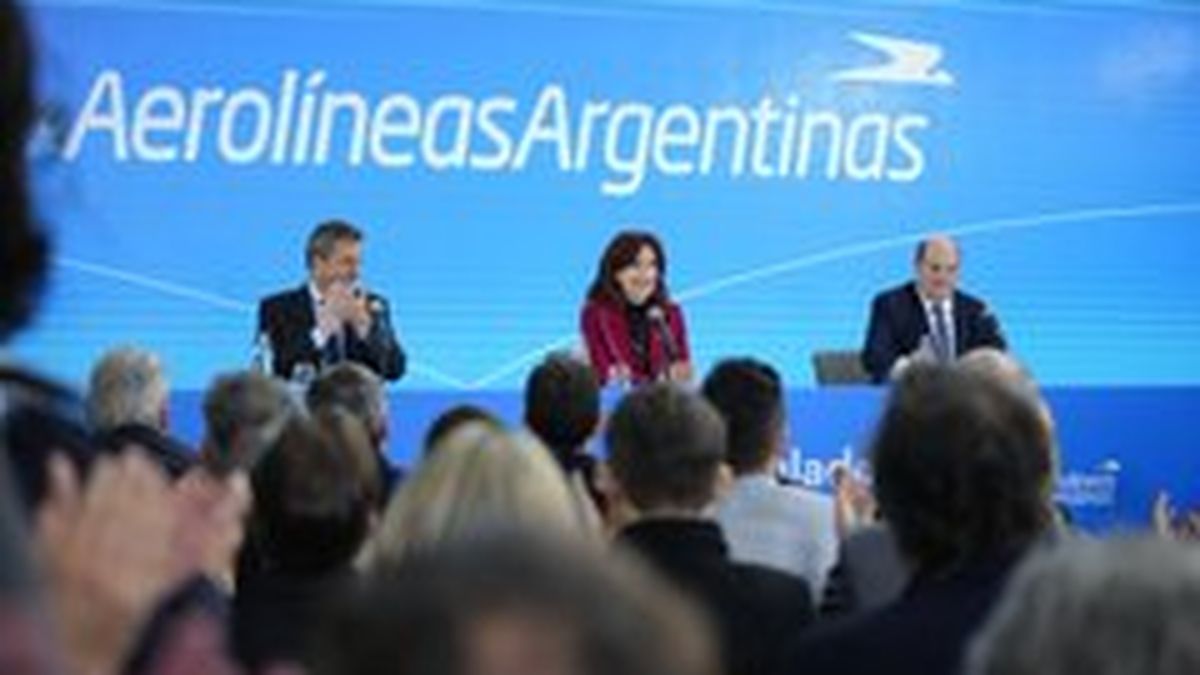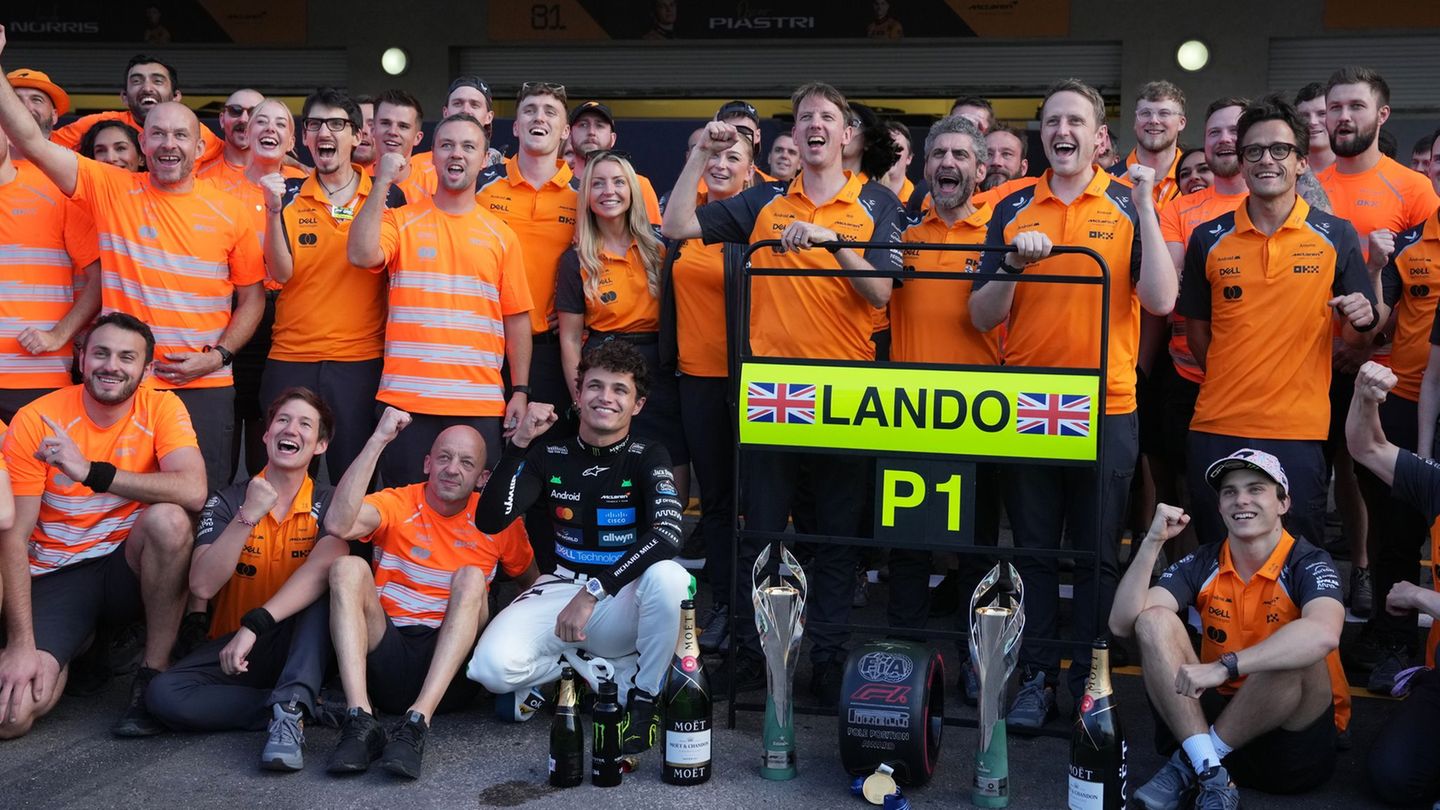The Government took advantage of the 15 years of the renationalization of Argentinian airlines to show unity, with a photo of the Minister of Economy and presidential candidate, Sergio Massaand the vice president Cristina Kirchner; and at the same time, polarize with the opposition’s discourse in the middle of the electoral campaign. Faced with the main criticism of Together for Change for the company’s deficit, the president of Airlines, Paul Cerianireported that losses dropped to less than half compared to 2019. As Ámbito was able to find out, in 2023 they aspire to close the year without contributions from the Treasury.
“This year the Treasury transferred zero to Aerolíneas Argentinas, what was paid were the outstanding balances of 2022”, indicated Massa during his speech. In addition, he added: “During the 2015-2019 administration, the efficient ones who teach us how to manage the State passed 300 million dollars to Airlines, sold simulators, decreased service, turned off connections and cannibalized the competition.”
Previously, Ceriani, described by Cristina Kirchner as a “functioning official”, had mentioned the numbers of the Aerolíneas balance sheet during his speech. Regarding the company’s losses, he stated that 2022 ended with “the lowest loss since nationalization”. Last year, the losses were $247 million. In 2018 they had been US$552 million and in 2019 US$667 million, the worst data in the last 5 years, given that in 2020, the year of the pandemic, the red was US$654 million. “Macri’s airplane revolution was worse for aviation than the pandemic,” Ceriani launched.
Ámbito asked the company what expectations they had for 2023 regarding losses. “They should be smaller”they answered. When asked if there could be an airline scenario without losses, they stated: “Of course it is possible.” For this, they affirm that the keys will be: expanding the number of passengers and the operation, generating new business units such as cargo transportation, making processes with unions more efficient and eliminating unproductiveness.
Despite positions such as that of former President Mauricio Macri, that Aerolíneas Argentinas must be “closed”, similar to that of Javier Milei, the Together for Change candidates such as Patricia Bullrich and Horacio Rodríguez Larreta publicly stated that the first step before thinking in a privatization or closure should be “to reach zero deficit”.
On this point, Ceriani mentioned: “One of the opposition’s workhorses is to close Airlines. Without Airlines, the Treasury would have fewer resources and would leave the provinces disconnected. Of the 39 destinations we fly to, it is the only one that flies in 21. Of the 46 routes that it flies without passing through Buenos Aires, 40 are flown only by Aerolíneas”. Company sources revealed to Ámbito that they do not have a dialogue with the opposition candidates for president, but they do with other leaders. “It is paradoxical, because opposition governors and mayors ask us for more flights, not less,” said an official source.
Treasury Contributions
Apart from the losses, another of the points in dispute is the contributions from the Treasury. From 2008 to the present, the peak occurred in 2012, when the State transferred US$905 million to Airlines. During the management of Cambiemos, it fell in the first years, but grew again in 2019, closing at US$426 million. From 2019 to here, the highest data was given in 2021 of US$645 million, and then the last balance of 2022 showed that it fell to US$353 million. The novelty is expected to happen this year. “This year the Treasury transferred $6,000 million to Airlines, which had been left over from the 2022 budget,” Ceriani said.
According to official sources, they aspire to end in 0% execution of the budgeted in 2023 of transfers from the Treasury to Airlines, although they explained that this will depend on factors exogenous to the company. For now, both domestic and inbound tourism maintained good numbers during the first semester.
Ámbito consulted how much the fact that there are only three airlines in the market influences the best numbers of the company: “Aerolíneas has a 65% market share, it is false that it is a monopoly. The other two airlines are expanding destinations and planes. And when several airlines disembarked in the airplane revolution, they ended up closing all of them or leaving the country,” an official source explained. Airlines’ response is that in the world the trend is towards the “concentration” of companies because it is a “large-scale business”, in a context of crisis in the aviation sector after the pandemic.
From the company they assure that with the sale of tickets they cover current expenses, but not capital ones. One of the alternatives they have in mind is to go out and finance themselves in the market, “as YPF does,” they say. Another of the projects is to achieve “public-private partnerships” for the financing of specific projects. In fact, in her 2008 renationalization speech, then-president Cristina Kirchner had assured that the company had to prioritize good service, and take “private participation” into account.
Source: Ambito




